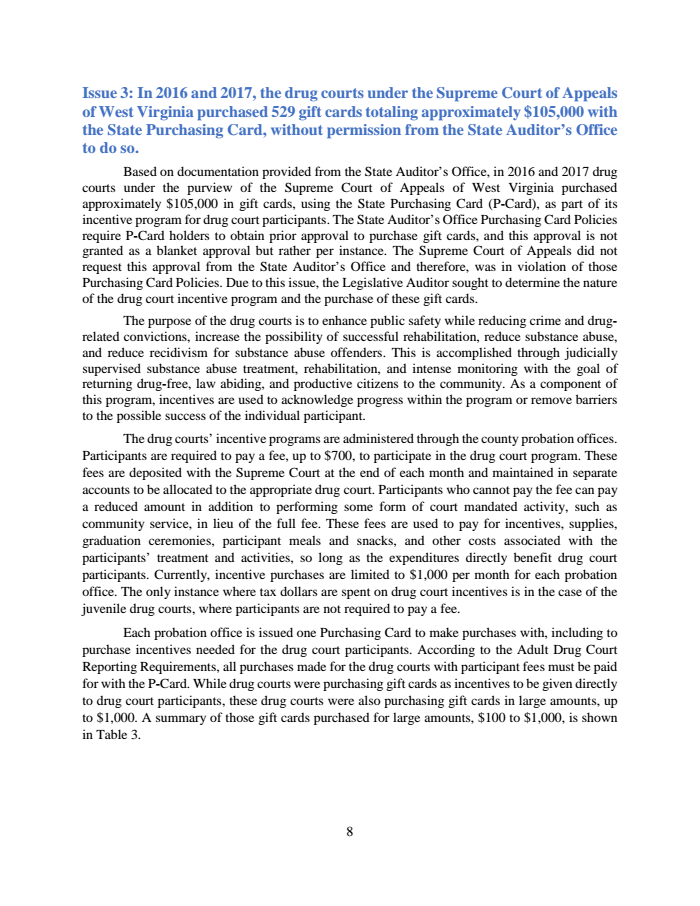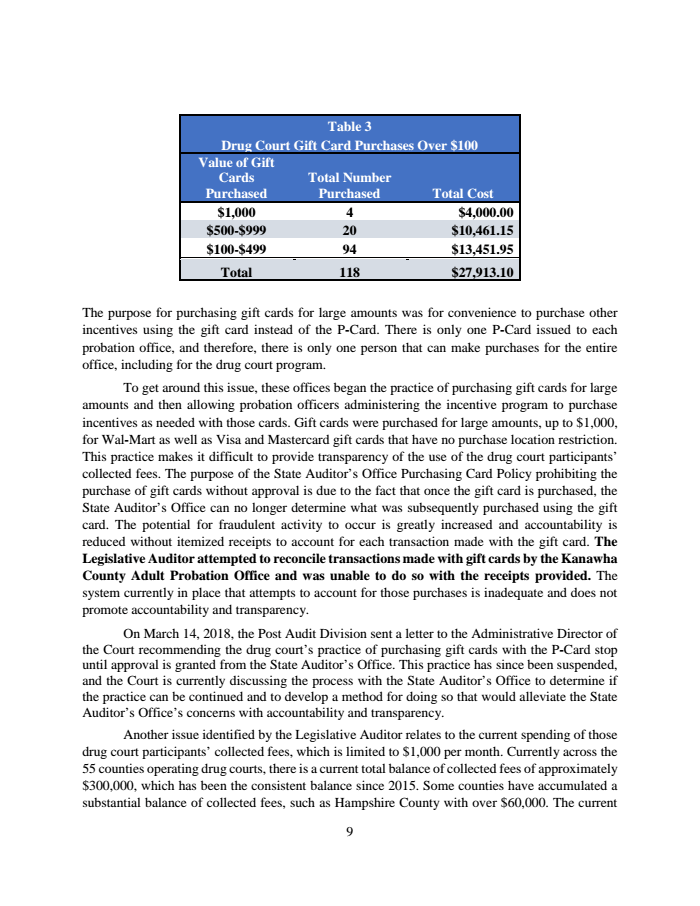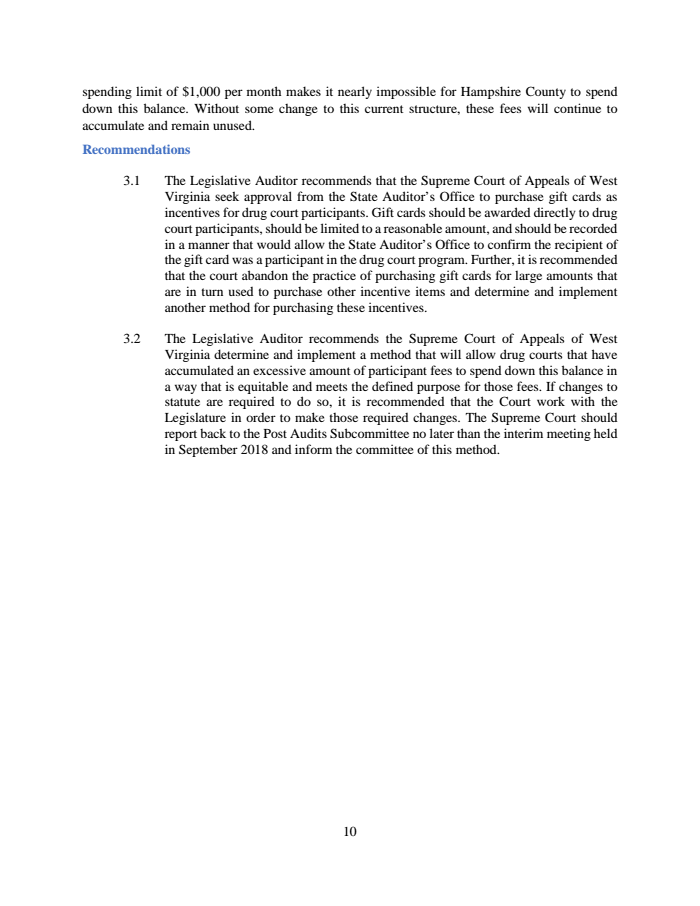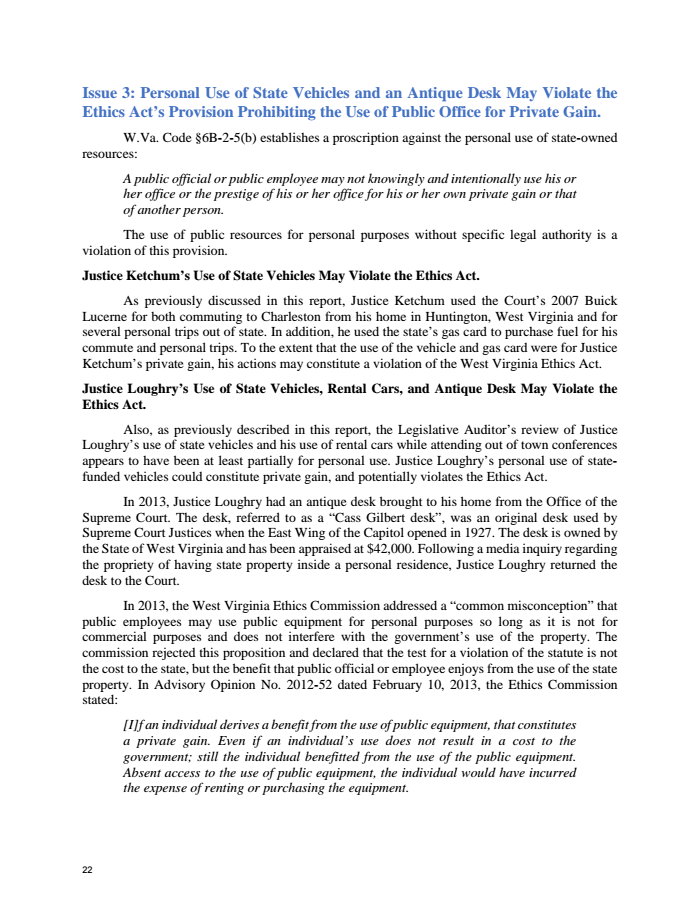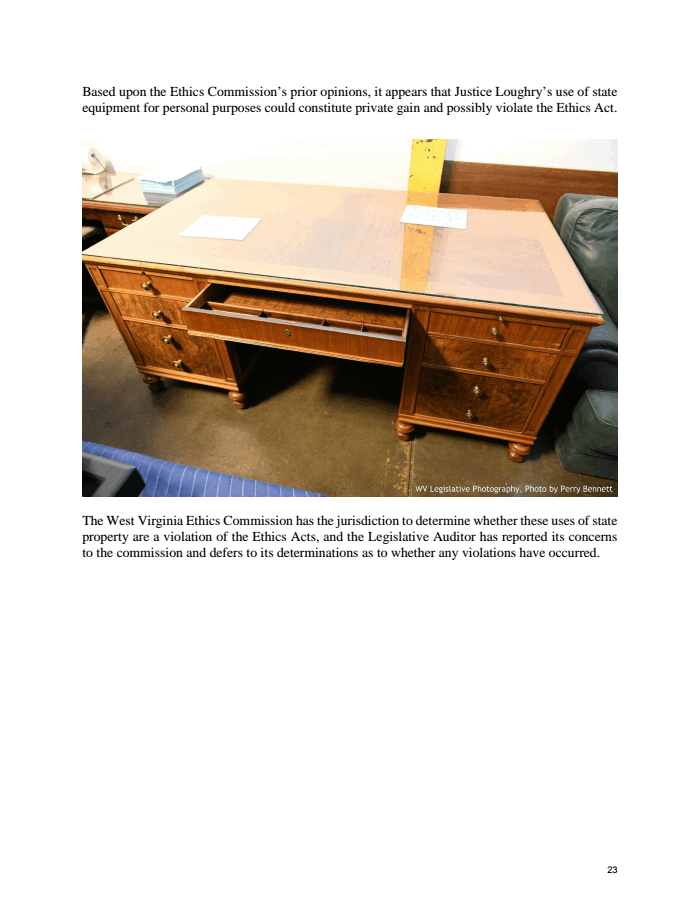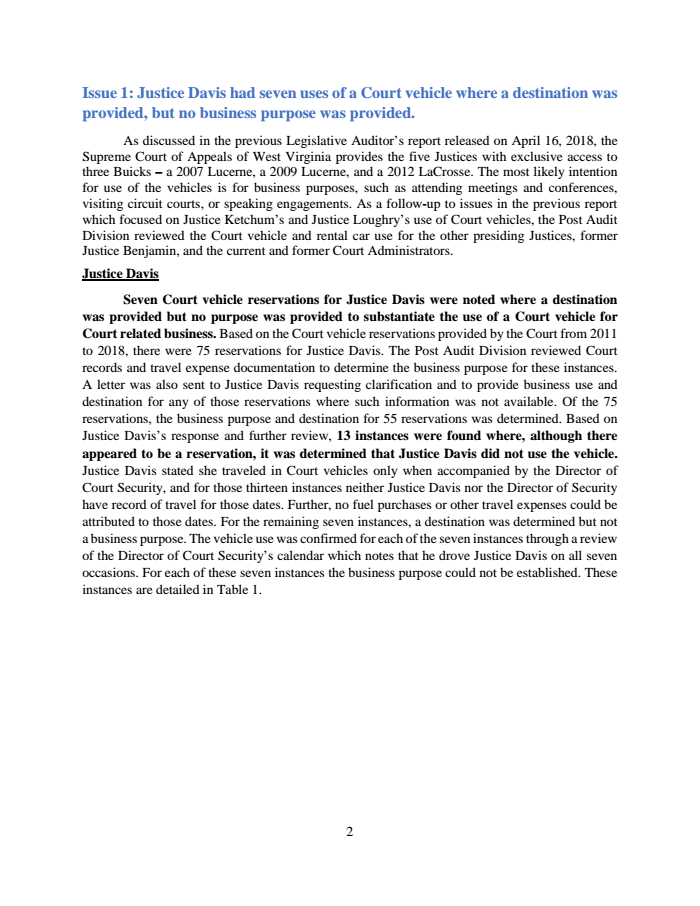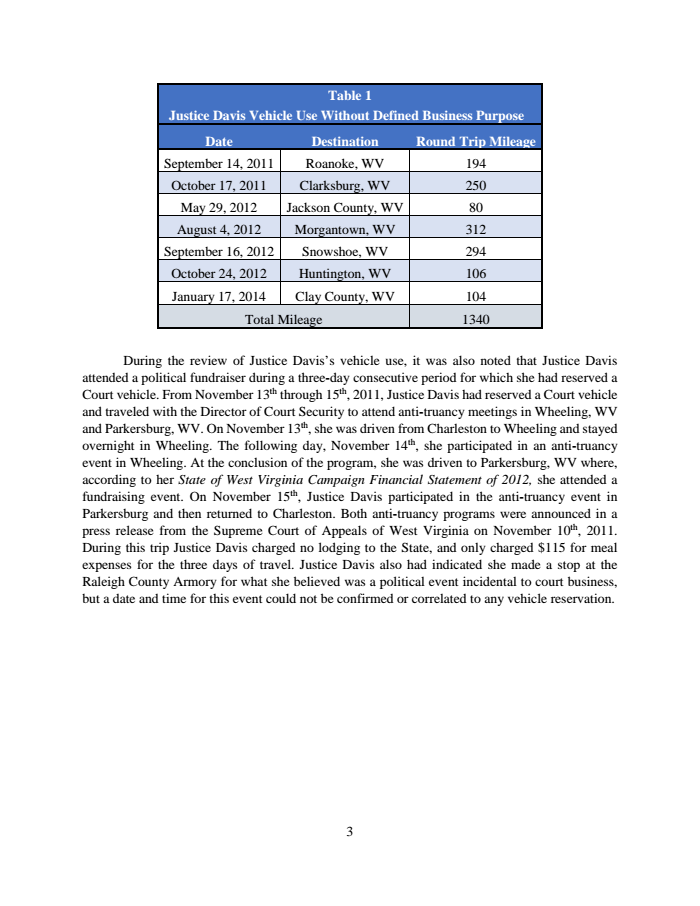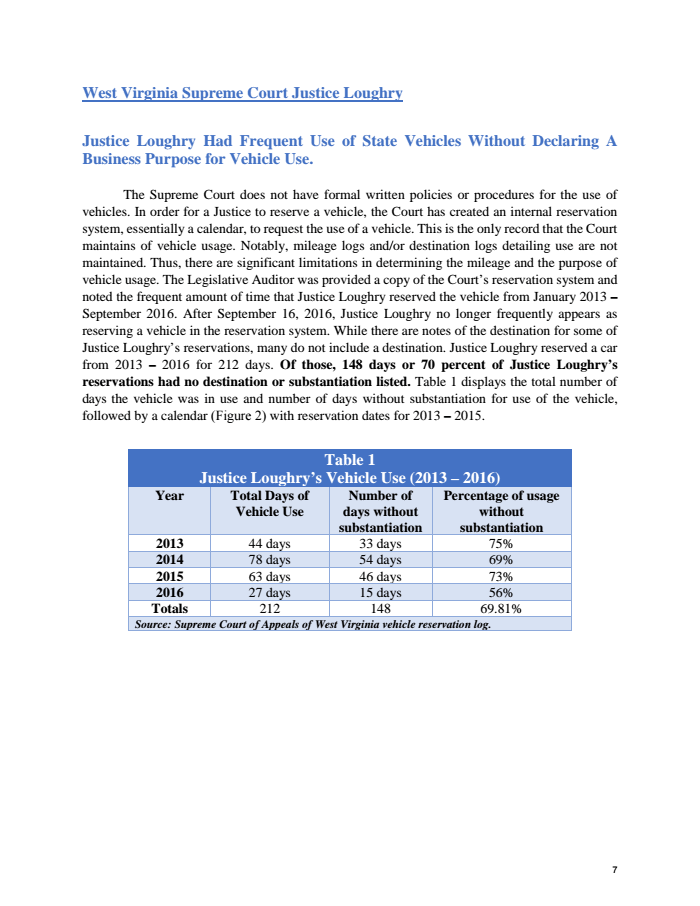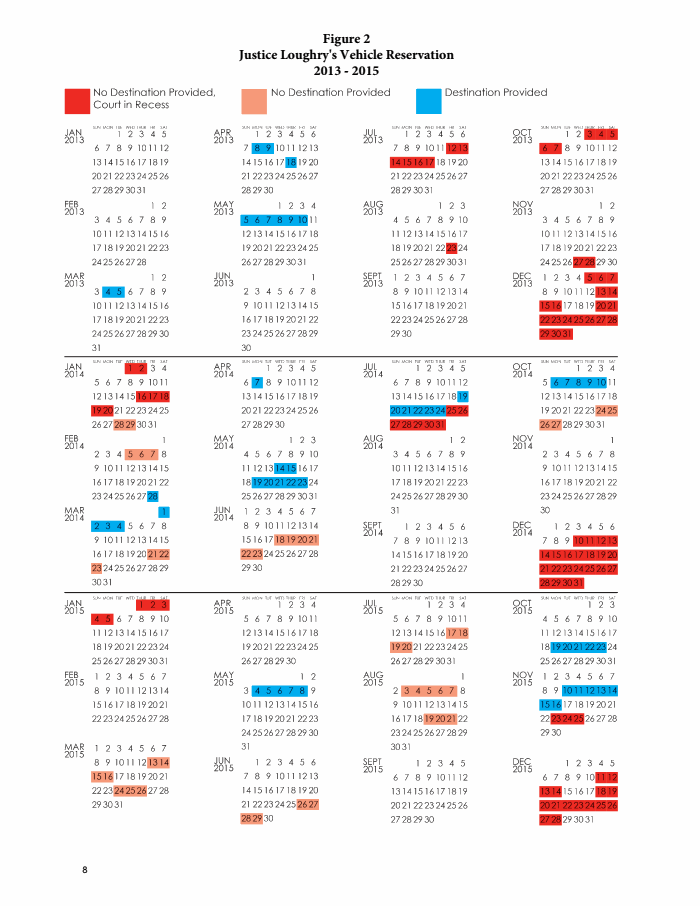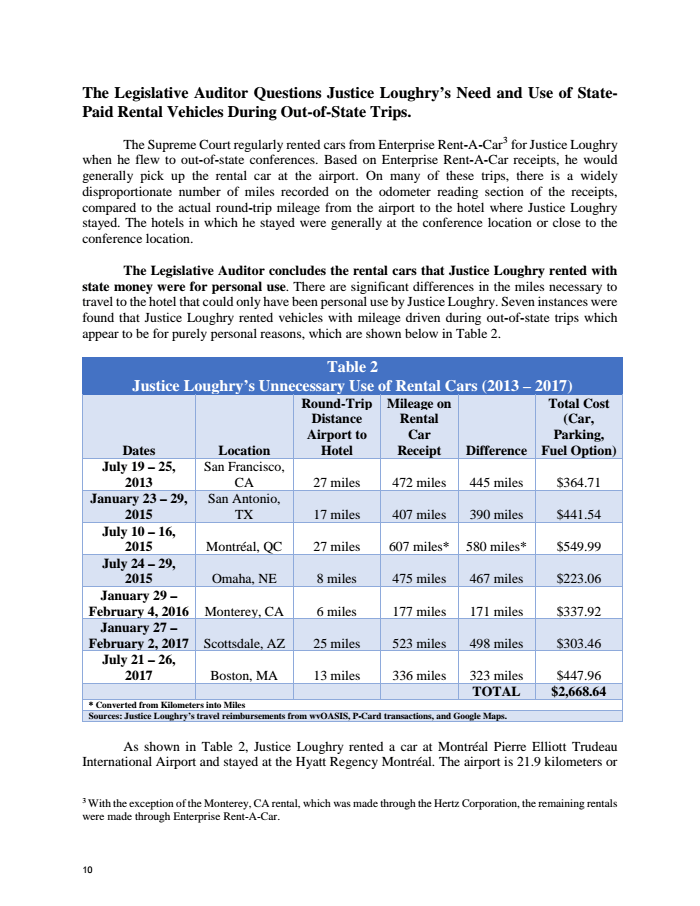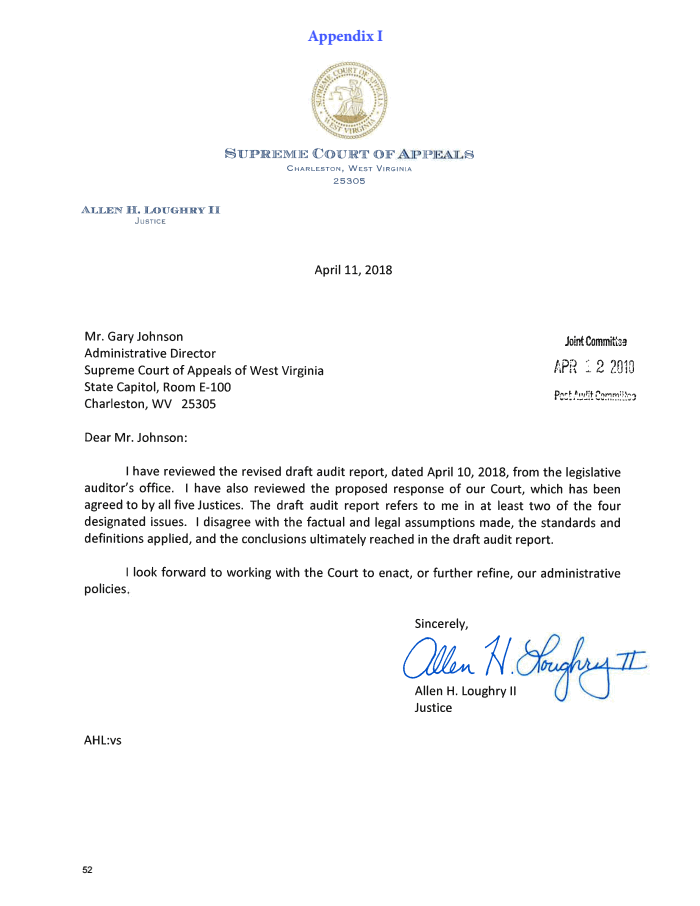The House Judiciary Committee began hearings to determine whether to recommend impeachment of one or more members of the West Virginia Supreme Court. Moment by moment, here’s what happened.
8:05 p.m. Adjourning until 9 a.m. Friday.
Chairman Shott: “It’s safe to say the retirement of Justice Ketchum and the progress we’ve made today has cut a day off our schedule.”
I take that to mean the Saturday that the committee had scheduled to meet this week is now open.
7:23 p.m. The focus is now on a build-up of surplus funds by the Supreme Court, followed by a rapid spend-down.
Over just a few years, West Virginia’s court system built up a budget surplus of $29 million.
Almost as quickly, while the Legislature was giving the Supreme Court the side eye over its budget independence, the court spent down the money to a few hundred thousand dollars.
The Legislative Auditor last month focused on how and why this happened. Justin Robinson, manager of the Post Audit Division, testified Thursday evening about the odd ups and downs of the court budget.
The Supreme Court oversees the budget for West Virginia’s entire judicial system.
The report from last month concluded, “The Legislative Auditor is concerned with the Court’s accumulation of appropriated General Revenue Funds in the majority of the years reviewed, with particular regard to the fact that in five years they had re-appropriated funds that went from $1.4 million in 2007 to $29 million in 2012.
“There is also concern over how these funds were subsequently spent down.”
Auditors first became aware of the spend down when they were reviewing memos written by Justice Allen Loughry.
In an August 2016 memo to the other justices responding to their questions about his vehicle use, Loughry questioned the “depletion of the court’s so-called rainy day fund in the amount of $26 million.”
That sent Legislative Auditor staff in search of how the excess funds had accumulated until 2012 and then how it was spent down to just $333,514 only four years later.
6:37 p.m. We’re back up and running here for the evening. Justin Robinson, manager of the Post Audit Division, is back on the stand. He had a marathon session much earlier today.
Now he’s talking about the Court’s use of state-issued purchasing cards to buy gift cards for people in the drug court system.
Honestly, I’d sort of forgotten about this issue.
In 2016 and 2017, the drug courts under the Supreme Court bought 529 gift cards totaling about $105,000 with the state purchasing card, without permission from the state Auditor’s Office to do so.
The gift cards were supposed to be incentives for participants. The act was meant to increase flexibility but it also decreased transparency for how the cards were being used.
“The Supreme Court of Appeals did not request this approval from the State Auditor’s Office and, therefore, was in violation of those Purchasing Card policies,” the Legislative Auditor wrote in a report earlier this spring.
Delegate Barbara Fleischauer, D-Monongalia, tonight asked if any of the justices lied or did anything illegal in regard to the purchasing cards. The answer was no.
Judiciary Committee staff counsel Brian Casto follows up to ask if using the purchasing cards without approval of the Auditor might not actually be a felony.
(b) It is unlawful for any person to knowingly or intentionally possess with the intent to use a purchasing card without authorization pursuant to section ten-a of this article or the rules promulgated pursuant to that section.
(c) Any person who violates the provisions of this section is guilty of a felony and, upon conviction thereof, shall be imprisoned in the penitentiary not less than one year nor more than five years, or fined no more than $5,000, or both fined and imprisoned.
5:36 p.m. Legislative Auditor Allred’s testimony concludes. The Judiciary Committee is taking a dinner break for 45 minutes.
Shott says his goal is to conclude testimony from legislative audits this evening.
So we’ll return in a bit.
3:57 p.m. With much of the day’s focus on the use of state vehicles by justices, the late afternoon turned to Justice Loughry’s possession of an antique desk dating back to the origins of the state Capitol at his home.
The antique desk was associated with famed architect Cass Gilbert from when the state Capitol was first built. A legislative audit valued the desk at $42,000.
The Legislative Auditor’s staff concluded Loughry may have violated the Ethics Act’s stipulations about using public office for private gain.
Legislative Auditor Aaron Allred testified that Loughry had used the desk when he was a clerk in the court and then had it moved to his home. Allred described receipts for moving companies that helped him move the desk.
Allred also described state employees helping Loughry move the desk out of his home and into a warehouse — while on the clock — after media reports focused on the whereabouts of the desk.
He said there were no apparent controls in place to keep track of Supreme Court or state property.
“In my 25 years here, I’m not sure I’ve come across an agency of this size that had a complete lack of inventory control,” Allred said.
3:50 p.m. After four, maybe five hours, witness Justin Robinson of the Post Audit Division is excused. Chairman Shott: “Mr. Robinson thank you for your appearance and your endurance.”
Next up is Aaron Allred, legislative manager for the West Virginia Legislature. He is also the Legislative Auditor and has been for about 25 years.
Aaron Allred takes questions from staff attorney Brian Casto pic.twitter.com/ke8VeofaKZ
— Brad McElhinny (@BradMcElhinny) July 12, 2018
3:40 p.m. Chairman Shott is asking how broad the court’s policies were on rental cars. “They put no controls on their own members.”
3:20 p.m. Lots more followup questions about justices’ use of state vehicles. Still on the stand is Justin Robinson of the Post Audit Division staff, who has had a marathon day.
2:03 p.m. Picking up with questioning about the travel habits of justices — in state vehicles or rental cars. One question by Delegate Charlotte Lane: “Does Justice Loughry *own* a car?” The assumption is yes, but no one knows specifically.
At another point, Delegate Tom Fast was asking whether, on a business trip, Justice Loughry should have taken his rental car to lunch or if he should have taken a cab — and whether any agency would reimburse a receipt for a cab trip for lunch.
1:51 p.m. We are back and there’s a discussion over the procedures for challenging rulings by the Judiciary chairman.
12:48 p.m. Lunch break. Reconvening at 1:30.
12:34 p.m. Committee members are asking a lot of questions about travel by Justice Robin Davis.
She didn’t travel a lot on the court’s dime, according to a legislative audit. But there were some trips where the purpose wasn’t easily accounted.
There were seven such instances discussed in the second legislative audit. She was accompanied by the Court’s director of security, who drove.
One of those instances as a three-day swing that included two anti-truancy events a political fundraiser and, possibly, a political event. The political fundraiser part, as well as whatever expense would result from the time for the security director, is what is getting the attention.
Here’s what the legislative audit said:
During the review of Justice Davis’s vehicle use, it was also noted that Justice Davis attended a political fundraiser during a three-day consecutive period for which she had reserved a Court vehicle. From November 13th through 15th, 2011, Justice Davis had reserved a Court vehicle and traveled with the Director of Court Security to attend anti-truancy meetings in Wheeling, WV and Parkersburg, WV.
On November 13th, she was driven from Charleston to Wheeling and stayed overnight in Wheeling. The following day, November 14th, she participated in an anti-truancy event in Wheeling. At the conclusion of the program, she was driven to Parkersburg, WV where, according to her State of West Virginia Campaign Financial Statement of 2012, she attended a fundraising event. On November 15th, Justice Davis participated in the anti-truancy event in Parkersburg and then returned to Charleston. Both anti-truancy programs were announced in a press release from the Supreme Court of Appeals of West Virginia on November 10th, 2011.
During this trip Justice Davis charged no lodging to the State, and only charged $115 for meal expenses for the three days of travel. Justice Davis also had indicated she made a stop at the Raleigh County Armory for what she believed was a political event incidental to court business, but a date and time for this event could not be confirmed or correlated to any vehicle reservation.
11:56 a.m. If you are the obsessed sort of person who would like to read this committee’s Rules of Procedure for impeachment, be my guest:
Judiciary Committee Impeachment Rules of Procedure (Text)
11:37 a.m. Members of the Judiciary Committee are now asking specific followup questions of Justin Robinson of the Post Audit Division staff.
11:34 a.m. MetroNews’ “Talkline” has been all over the impeachment proceedings this morning. Here are some highlights:
WV State Delegate Mike Caputo (D-Marion) talks with @HoppyKercheval about today’s impeachment proceedings. WATCH: https://t.co/wkudfIAoe1 pic.twitter.com/8PZ2rwR0Rb
— MetroNews (@WVMetroNews) July 12, 2018
MetroNews Legal Analyst, Harvey Peyton, rejoins @HoppyKercheval to provide an update on this morning’s impeachment proceedings. WATCH: https://t.co/wkudfIAoe1 pic.twitter.com/oitpWuZRSm
— MetroNews (@WVMetroNews) July 12, 2018
MetroNews Legal Analyst, Harvey Peyton, and MetroNews Anchor, @JeffJenkinsMN, join @HoppyKercheval to preview today’s House Judiciary Committee hearings on State Supreme Court impeachment & Rise WV. WATCH: https://t.co/wkudfIAoe1 pic.twitter.com/mOd5iFIWUU
— MetroNews (@WVMetroNews) July 12, 2018
11:27 a.m. We’re now talking about the state vehicle usage by other justices. That audit, which was presented separately from the first, was much less contentious.
The most significant findings were about former court administrator Steve Canterbury, who can’t be impeached.
Those issues were covered here.
The audit showed Justice Robin Davis had seven uses of a court vehicle where a destination was provided by no business purpose was provided.
The report found no particular issues with Former Justice Brent Benjamin, Justice Beth Walker, current Chief Justice Margaret Workman or current Administrative Director Gary Johnson.
The audit did find that Benjamin had significantly more travel expenses reimbursed to him than other judges — about $123,457 from 2010 to 2016. But his records were all meticulous. Benjamin wouldn’t be impeached since he’s no longer on the court.
Post Audit Report – West Virginia Supreme Court of Appeals – Report 2 – https://t.co/WyuNBwDBHC #WVLegis
— WV Legislature (@wvlegislature) May 20, 2018
10:47 a.m. The first witness is Justin Robinson of the Post Audit Division staff. He is up front at a table.
He’s starting by discussing Audit No. 1, which got into the use of state vehicles.
The first audit concluded justices Loughry and Ketchum drove state vehicles for personal use without properly claiming the perk as a taxable fringe benefit.
Robinson says the Legislative Auditor began to look into that matter because of issues raised in the media.
Loughry used both a 2009 Lucerne and the 2012 LaCrosse, along with additional court vehicles, for multiple periods of undocumented use.
The Legislative Auditor questioned whether Loughry’s use of the state vehicles was truly for business purposes — or may have been for a mix of business and pleasure travel.
Auditors went over a calendar used by court officials to claim vehicles. Loughry reserved a car a total of 212 days from 2013 to 2016. Of those, 148 days had no destination or work purpose listed.
Many of Loughry’s reservations were in the months of December.
Auditors wrote, “Notably, Justice Loughry had a state vehicle for 27 consecutive days through the Christmas and New Year’s holidays from December 10, 2014, to January 5, 2015.
“The Supreme Court of Appeals was in recess during all the December dates, and no destination or substantiation is listed for any of these time frames. The Legislative Auditor is unable to find any purposes for which Justice Loughry used the vehicles during the December months.”
Supreme Court of Appeals 4 15 18 (Text)
Loughry also rented vehicles during several trips out of state.
Auditors questioned whether Loughry’s mileage on the rented vehicles was in line with the stated business purpose of the travel.
“On many of these trips, there is a widely disproportionate number of miles recorded on the odometer reading section of the receipts, compared to the actual round-trip mileage from the airport to the hotel where Justice Loughry stayed,” the auditors wrote.
For example, on a trip to Montreal, Loughry stayed at a Hyatt Regency that was 13.6 miles from the airport. But, according to an Enterprise Rent-A-Car receipt, the car was driven 607 miles.
On a trip to Omaha, Nebraska, the distance between the airport and the hotel was 4 miles. Yet the rental vehicle was driven 475 miles.
Seven such trips cost the state $2,669.
“Based on this analysis,” the auditors concluded, “it appears possible that Justice Loughry, or a travel companion allowed to use rental cars, vacationed on the state’s dollar.”
Loughry submitted a memo disputing the results of the audit.
“I disagree with the factual and legal assumptions made, the standards and definitions applied, and the conclusions ultimately reached in the draft audit report,” Loughry wrote.
10:44 a.m. Giving you the lay of the land, Chairman Shott is up front, along with vice chairman Roger Hanshaw and the ranking Democrat, Barbara Fleischauer.
The Judiciary Committee members are in the first three rows.
Media in the back. I am in the seat normally occupied by Delegate Andrew Byrd. He warned me not to leave crumbs.
Rusty Marks of the State Journal is to my right. WOWK’s Mark Curtis is right behind me. Kennie Bass, who broke the original Supreme Court story for WCHS, is right in front of me.
Sounds like we’ll be going well into the evening today.
Important notes:
Related pic.twitter.com/kOUY7WnBOA
— Brad McElhinny (@BradMcElhinny) July 12, 2018
10:37 a.m. Oh, by the way, what’s this all about? If you are a recently-relocated West Virginia resident, then welcome. And if you have just awoken from cryogenic freeze, congratulations.
This all started last September with news reports about lavish renovations of justices’ chambers: the $32,000 couch and $7,500 wooden inlaid floor in Justice Allen Loughry’s office, a $500,000 office renovation and $28,000 rugs in Justice Robin Davis’s office, and a $130,000 upgrade of Justice Beth Walker’s chambers.
Loughry denied guiding his own renovations and matters got worse.
Controversy then erupted over Loughry’s possession at his home of an antique desk associated with famed architect Cass Gilbert from when the state Capitol was first built. He took it home in 2012 while he was still a law clerk.
Then another couch added fuel to the fire. Loughry was accused of taking home a leather couch that had belonged to Justice Joseph Albright.
All those scandals came to a head this summer when Loughry was first charged by the state Judicial Investigations Commission and then by the U.S. Attorney’s Office. In each case, Loughry was accused not only of misusing state resources but, worse, lying about the acts to investigators.
He has been suspended from the Supreme Court.
But the impeachment proceedings aren’t just about Loughry. Any of the five members of the Supreme Court can be impeached.
Well, except one. Justice Menis Ketchum announced his retirement yesterday.
10:28 a.m. The recent reports of the Legislative Auditor will be the first evidence presented.
The committee has also subpoenaed information from the Judicial Investigations Commission, but staff still has to go through it.
The first audit concluded Loughry and Ketchum drove state vehicles for personal use without properly claiming the perk as a taxable fringe benefit. The second examined use of state vehicles by other justices and additional employees of the court.
The third, released last month, concluded that the court system built up a budget surplus of $29 million and then quickly spent down the money to a few hundred thousand dollars. A big question was whether justices did that on purpose to evade budgetary scrutiny by the Legislature.

10:23 a.m. Chairman Shott reading from former Judiciary Chairman Hatcher’s guidance from 1989. It goes into what happens if someone being considered for impeachment resigns or retires. This would have a direct bearing on the case of Justice Ketchum, who announced his retirement yesterday.
Shott says matters involving the court as a group would remain relevant. But the committee will not get into specific findings about Justice Ketchum any more.
“That should shorten our proceedings somewhat.”
10:10 a.m. Chairman Shott begins with a discussion of yesterday’s retirement of Justice Menis Ketchum, who was facing serious allegations of using state vehicles for personal gain.

“We will not be spending any time with the evidence affecting Justice Ketchum.”
Shott says that will affect the schedule and may shorten the hours and possibly by a day, which would have been Saturday.
Shott, who has had a long legal career, briefly discusses some of the more serious matters he’s faced. “None of that is more serious than what we’re doing.”
The state Constitution lays out the grounds for impeachment but only in the broadest terms: “Any officer of the state may be impeached for maladministration, corruption, incompetency, gross immorality, neglect of duty, or any high crime or misdemeanor.”
What those terms mean, precisely, will be up to the House of Delegates as the body that presents articles of impeachment and then the state Senate, which acts as a jury.
Shott says, “We have an obligation to hold accountable the public officials that the public can’t hold accountable,” referencing the 12-year terms of Supreme Court Justices.
But he adds, “We are encroaching, in a sense, on a separate branch of government.”
He says the Senate, which would act as a jury, “would require clear and convincing evidence.”
Chairman Shott offers introductory remarks pic.twitter.com/a7YAHTziQf
— Brad McElhinny (@BradMcElhinny) July 12, 2018
10:07 a.m. Impeachment proceedings are starting in the House of Delegates chambers, where members of the House Judiciary Committee will be taking evidence about the behavior of the state Supreme Court.
Judiciary Chairman John Shott is at the front of the room, with members of the committee in the first three rows of the chamber.
“Good morning. Call this meeting of the Judiciary Committee to order,” Shott says.
Attorneys are off on the left wing, and witnesses look to be at a podium at the front. There is a big screen to display materials.
We’ll be providing updates and streaming here throughout the day.


